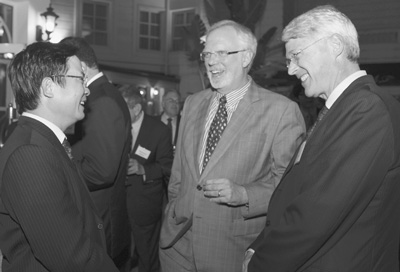 Vietnam Vice Minister of Science and Technology Le Dinh Tien, U.S. Ambassador to Vietnam David Shear, and GNF codirector Scott D. Sagan (Stanford University) |
With nearly every nation in Southeast Asia exploring the possibility of developing a civilian nuclear power program, the Academy’s Global Nuclear Future (GNF) Initiative is working to create a culture of safety and security in the operation and oversight of nuclear facilities in the region.
The Academy recently convened delegates from a dozen nations for an off-the-record meeting in Hanoi, Vietnam. Senior government officials and policy experts from Egypt, India, Indonesia, Japan, Malaysia, the Philippines, Russia, Singapore, South Korea, Sri Lanka, Thailand, the United States, and Vietnam candidly discussed the political, technical, and nonproliferation issues related to the expansion of nuclear energy in Southeast Asia. The goal of the meeting–and of the larger Initiative–was to identify, refine, and promote measures that will limit the safety, security, and proliferation risks associated with a growing global nuclear footprint.
According to Scott D. Sagan (Stanford University), who codirects the GNF Initiative with Steven E. Miller (Harvard University), “A key strand of the GNF project has focused on two regions – Southeast Asia and the Middle East – where there is strong government interest in nuclear power, but limited technical capacity, a fledgling regulatory infrastructure, and uncertain public acceptance of the technology.”
At the Hanoi meeting, policy-makers from throughout Southeast Asia, as well as technical experts and industry representatives from countries with established nuclear programs, outlined the nuclear power plans of individual states and shared best practices for ensuring that the programs advance as safely as possible. Delegates discussed ways to create a culture of safety in the operation of nuclear facilities in the post-Fukushima era, methods of ensuring the transparency of civilian nuclear power programs, and ideas for managing the nuclear fuel cycle, including the concept of regional storage and disposal of used fuel, among other topics. Vietnam’s Vice Minister of Science and Technology, Le Dinh Tien, told conference participants that his country hopes to have nuclear power generation online by 2020. He said that the Academy-sponsored meeting will help provide “common ground for the safe, secure, and peaceful use of nuclear energy.”
U.S. Ambassador to Vietnam David Shear also addressed the group. He noted that all the nations in the region are growing rapidly and are in various stages of weighing nuclear power to meet increased energy demands. “No one nation can ensure the safe and secure development of nuclear energy,” Shear said. “That’s why conferences like this are so important.”
The regional strategies that were discussed at the meeting will be disseminated to the broader international nuclear-energy policy community. The GNF project is organizing a series of publications that will address the economic, technical, public policy, and security challenges faced by nations in Southeast Asia that do not currently have nuclear power plants but have plans to acquire them or are in the process of doing so.
The meeting in Hanoi, organized in collaboration with the Vietnam Atomic Energy Agency, followed Academy-sponsored regional conferences on the Global Nuclear Future in the United Arab Emirates in 2009 and in Singapore in 2010.